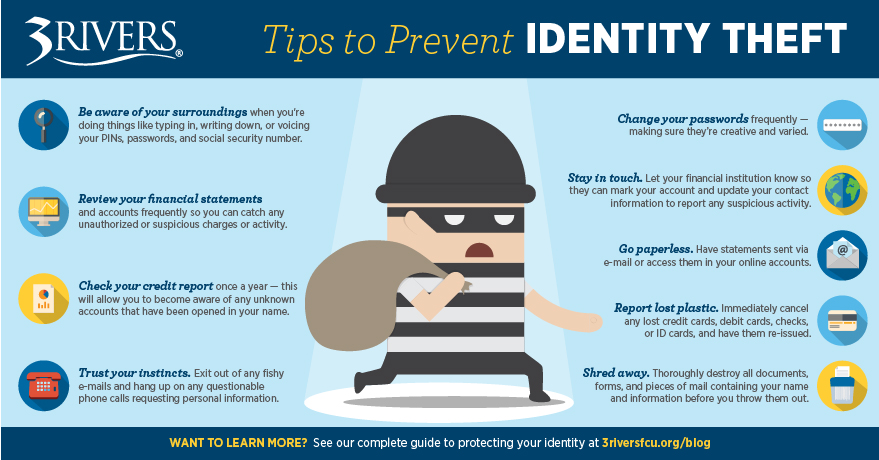Personal Finance 101: Preventing Identity Theft + Fraud
In some cases, for someone who intends to use your information to better their situation, having access to your name and address are enough to cause damage. But toss in your social security number and date of birth, and an identity thief can do just about anything he or she desires - like open a line of credit, land a job, file a tax return, drain your retirement savings, give the authorities your name if they're arrested, and so much more.
How Can an Identity Thief Obtain Your Information?
Especially in this day and age, identity thieves have multiple ways to steal, or attempt to steal, your personal and sensitive information. Some ways they may go about it are:
- Over the Phone: Phishing scams via e-mail and phone call are very common. Identity thieves may call claiming to be your financial institution or doctor's office, the IRS, or another organization you trust, and may be pretty convincing. Typically, they claim that they’re calling simply to update or verify sensitive information that your real institution already has, and other times they’ll threaten to take some kind of legal action if you don’t make an immediate payment on some bogus debt.
- In Your Backyard: Identity thieves aren’t afraid to get down and dirty. Sure, there's the occasional, harmless dumpster diver looking for salvageable furniture and recyclable cans, but identity thieves are on the hunt for something else: your private documents and your junk mail. Anything with your name and an address attached. An old pay stub, a discarded credit card offer, an outdated letter - if it's still intact, a thief can use it.
- In Public: Identity thieves can easily obtain your PINs, passwords, and other private numbers and information simply by watching over your shoulder as you enter them, or listening in on a phone call you’re having in public. Additionally, skimming devices and other methods of hacking systems – at a local and national level – are also threats.
What are the Consequences for a Victim of Fraud?
While spending your hard-earned cash is one way identity thieves can leave you in bad shape, they can also ruin your credit score. This could impact your ability to purchase or rent a home or vehicle, and make it more difficult - or even impossible - to obtain a new financial account, job, passport, and more. Even scarier, identity theft could lead to false imprisonment. That is, they land themselves in jail or prison, but use your identity when they get booked.
How Can You Prevent Identity Theft?
So, what steps can you take to prevent identity theft?
- Be Aware: Be aware of your surroundings when you're doing things like typing in, writing down, or voicing your PINs, passwords, and social security number.
- Stay Up-to-Date: Frequently review your financial statements and accounts so you can catch any unauthorized or suspicious charges or activity.
- Check Your Credit Report: Check your credit report once a year - this will allow you to become aware of any unknown accounts that have been opened in your name.
- Trust Your Instincts: Exit out of any fishy e-mails and hang up on any questionable phone calls - if they claim to be your financial institution or another organization you trust, and are requesting updated personal information, do not respond until you've contacted the real business directly, yourself.
- Update Passwords: Change your passwords frequently - making sure they’re creative and varied. Incorporate upper and lowercase letters, numbers, and symbols.
- Stay in Touch: Let your financial institution know if you're heading out of state and where you'll be, for how long, so they can mark your account and update your contact information, to report any suspicious activity.
- Go Paperless: Request to have statements sent via e-mail, or access them in your online accounts, instead of having them sent through postal mail, where they might get into the wrong hands.
- Report Lost Plastic: Immediately cancel any lost credit cards, debit cards, checks, or ID cards, and have them re-issued.
- Shred Away: Thoroughly destroy any and all documents, forms, and pieces of mail containing your name and information before you throw them out. Invest in a shredder or take advantage of places that offer shredding services.
What Should You Do if You’re a Victim of Fraud?
If you’ve fallen victim to fraud, you’ll want to take immediate action. Contact your financial institution, file a police report, and put a hold on any cards that were stolen or accounts that you believe may be at risk. Visit our Fraud Protection page for additional information and resources about preventing and responding to identity theft.
Also keep in mind that, in many cases, retailers, healthcare organizations, and other entities that experience large-scale security breaches may offer their customers free credit monitoring for a period of time.
Take the proper steps to keep yourself, your family, and your accounts safe from identity thieves, and it'll be a lot harder for them to win!

